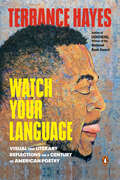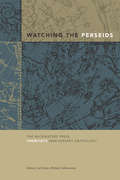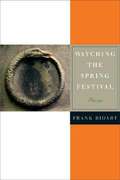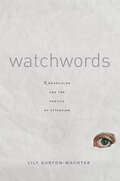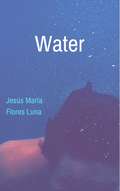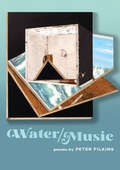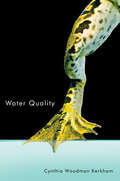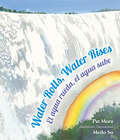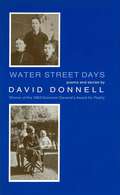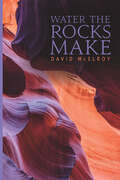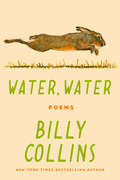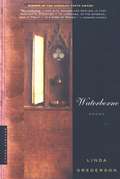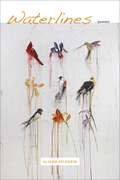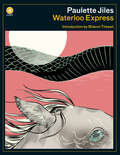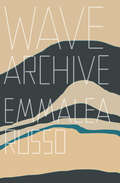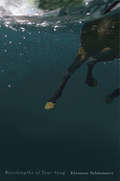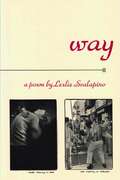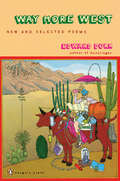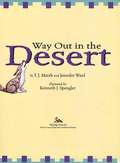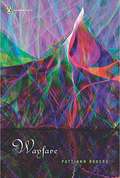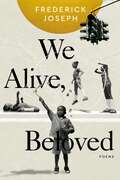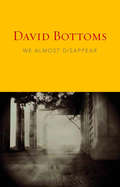- Table View
- List View
Watch Your Language: Visual and Literary Reflections on a Century of American Poetry
by Terrance HayesFrom the National Book Award–winning author of Lighthead, Terrance Hayes, a fascinating collection of graphic reviews and illustrated prose addressing the last century of American poetry—to be published simultaneously with his latest poetry collection, So to SpeakCanonized, overlooked, and forgotten African American poets star in Terrance Hayes's brilliant contemplations of personal, canonical, and allegorical literary development. Proceeding from Toni Morrison's aim to expand the landscape of literary imagination in Playing in the Dark ("I want to draw a map, so to speak, of a critical geography"), Watch Your Language charts a lyrical geography of reading and influence in poetry. Illustrated micro-essays, graphic book reviews, biographical prose poems, and nonfiction sketches make reading an imaginative and critical act of watching your language. Hayes has made a kind of poetic guidebook with more questions than answers. "If you don't see suffering's potential as art, will it remain suffering?" he asks in one of the lively mock poetry exam questions of this musing, mercurial collection. Hayes's astonishing drawings and essays literally and figuratively map the acclaimed poet's routes, roots, and wanderings through the landscape of contemporary poetry.
Watching the Perseids: The Backwaters Press Twentieth Anniversary Anthology
by Cat Dixon Michael CatherwoodWatching the Perseids: The Backwaters Press Twentieth Anniversary Anthology features poems from authors from the past 20 years. This anthology commemorates The Backwaters Press’s 20 years as a nonprofit literary publisher located in Omaha, Nebraska. Virtually every poet published by the press in its first two decades is represented here with two new, previously unpublished poems selected specifically for this volume.
Watching the Spring Festival
by Frank BidartThis is Bidart's first book of lyrics not dominated by long poems. Less embattled than earlier work, these new poems have, by conceding times finalities and triumphs, acquired a dark radiance unlike anything seen before in Bidart's long career.
Watchwords: Romanticism and the Poetics of Attention
by Lily Gurton-WachterThis book revisits British Romanticism as a poetics of heightened attention. At the turn of the nineteenth century, as Britain was on the alert for a possible French invasion, attention became a phenomenon of widespread interest, one that aligned and distinguished an unusual range of fields (including medicine, aesthetics, theology, ethics, pedagogy, and politics). Within this wartime context, the Romantic aesthetic tradition appears as a response to a crisis in attention caused by demands on both soldiers and civilians to keep watch. Close formal readings of the poetry of Blake, Coleridge, Cowper, Keats, (Charlotte) Smith, and Wordsworth, in conversation with research into Enlightenment philosophy and political and military discourses, suggest the variety of forces competing for--or commanding--attention in the period. This new framework for interpreting Romanticism and its legacy illuminates what turns out to be an ongoing tradition of war literature that, rather than give testimony to or represent warfare, uses rhythm and verse to experiment with how and what we attend to during times of war.
Water
by Jesús María Flores LunaIt is a collection of poems about water. From its appearance and the first contact of man with him, after his daily use of survival for the world, until the flow and the race below the cities and their current contamination. Translation of Agustina Jazmín Lombardo
Water / Music (Johns Hopkins: Poetry and Fiction)
by Peter FilkinsA diverse display of formal dexterity, narrative power, and lyrical resonance, Peter Filkins's latest collection of poems explores the fraught relationship between the natural world and the human.Exploring the space between nature and culture, the poems of Water / Music anchor themselves in the timely and the timeless. Rich and diverse in their formal intricacy, they move with ease from narrative to meditation, from close physical observation to the haunts of memory, and from lyric sorrow to the pleasure of living in the world. Water / Music embraces and celebrates life's mystery and the soul's repose amid "talismans at twilight, the whir of birds."
Water Quality (Hugh MacLennan Poetry Series #85)
by Cynthia Woodman KerkhamI find my bearings by clouds of moon jellies / afloat beneath my anchored boat, / pulsing the sea’s bright night, / their milky way, unfurling.In these lush and vivid poems water gloves a swimmer’s body, is “satin, yes, viscous. Albumen, vernix, newborn slick.” It “rinses gai lan – bright green in a silver bowl” in Hong Kong or hibernates in the Pacific Northwest “under a silky pelt / of rain. People-less. Days, months of this / hiss, softness breaking cliffs.”Cynthia Woodman Kerkham ponders the urgent question, What does water want? Whether as the body of a beloved lake, where people wrestle with the concerns of stewardship, or as the sea in which to sail and drift, or as a gene pool simmering through a family’s veins, water is the main character here. It can be turbid, the amniotic colour of spittle, or, in a time of drought, “brilliant beads.” As “a stream flushed over granite,” water seems to want “so little it shares another’s colour,” yet here, it gets our full and necessary attention.Rich with vibrant language and intensity, these poems sizzle in lyric form, monologues, elegy, and haibun. Water Quality calls on us to consider that our very survival is at stake unless we make a vow to this vital element to cherish it as we would a partner.
Water Rolls, Water Rises / El agua rueda, el agua sube: El Agua Rueda, El Agua Sube
by Pat MoraNow in paperback: In a series of poetic verses in both English and Spanish, readers learn about the movement and moods of water around the world and the ways in which water affects different landscapes and cultures.Water rolls/El agua rueda onto the shore/hacia la orilla under the sun, under the moon./bajo el sol, bajo la luna. Here is an ode to the beauty of the natural world as expressed by the movement and moods of water. With every evocative verse, we visit one of fourteen different water landscapes and cultural areas around the world. Each is stunningly illustrated with a breathtaking view of the drama, joy, power, serenity, grandeur, or peacefulness of water. From the Grand Canal of Venice to Qutang Gorge in China, from the Sahara in Morocco to the Andes of Chile, we learn about the world through the lens of water, our most precious, life-giving resource.
Water Sings Blue: Ocean Poems
by Kate Coombs Meilo SoCome down to the shore with this rich and vivid celebration of the ocean! With watercolors gorgeous enough to wade in by award-winning artist Meilo So and playful, moving poems by Kate Coombs, Water Sings Blue evokes the beauty and power, the depth and mystery, and the endless resonance of the sea.
Water Street Days: Poems and Stories
by David DonnellPoems and stories in which Donnell examines his past and his childhood; the poems are narrative confessions.
Water the Rocks Make (The Alaska Literary Series)
by David McElroyThe poems of Water the Rocks Make commit into words the turbulence of emotion and thought stirred up by life’s events: family trauma, psychiatric instability, the legal system, the death of a loved one, identity, cultural displacement, work, loss, creativity, and through everything, love. Set primarily in Alaska, where author David McElroy has lived most of his life, the real action in these poems is in thought—the mind coming to terms (words) with consciousness, the mixing and rendering of reality and imagination. McElroy delves down the many rapid turns toward meaning through these contemplations on personification of a long-tailed boat in Asia; Adam tasked with naming the creatures; synthesizing the agony of accident, disease, and death; Descartes musing about an oilfield bridge; the excitement of sensual love; or the history and creativity emerging from a landfill. There is sadness here, but through the rigorous manipulation of imagery, rhythm, and sound, Water the Rocks Make strives to “…contribute their daily/ details in our remarkable trick of happiness…to rise from the mulch/ of dreams like seedling teak goofy with life/ and floppy leaves.”
Water, Water: Poems
by Billy CollinsFrom the former Poet Laureate of the United States and New York Times bestselling author of Aimless Love comes a wondrous new collection of poems focused on the joys and mysteries of daily life.&“Among the best poems that [Billy] Collins has ever written.&”—Maureen Corrigan, NPR&“Witty, wry and tender when it hurts, Water, Water is a pleasure to read and easy to give.&”—The Washington Post&“Collins remains the most companionable of poetic companions.&”—The New York TimesIn this collection of sixty new poems, Billy Collins writes about the beauties and ironies of everyday experience. A poem is best, he feels, when it begins in clarity but ends with a whiff of mystery. In Water, Water, Collins combines his vigilant attention and respect for the peripheral to create moments of delight. Common and uncommon events are captured here with equal fascination, be it a cat leaning to drink from a swimming pool, a nurse calling a name in a waiting room, or an astronaut reciting Emily Dickinson from outer space. With his trademark lyrical informality, Collins asks us to slow down and glimpse the elevated in the ordinary, the odd in the familiar. It&’s no surprise that The New York Times and The Wall Street Journal both call Collins one of America&’s favorite poets.The Monet ConundrumIs every one of these poemsdifferent from the othershe asked himself,as the rain quieted down,or are they all the same poem,haystack after haystackat different times of day,different shadows and shades of hay?
Waterborne
by Linda GregersonA stirring, brilliantly crafted collection, Linda Gregerson's third volume of poetry examines mortality in all its beauty and horror. Fluently rendered in Gregerson's distinctive three-line stanzas, these poems explore subjects from autism to genealogy to ecology. Their occasions are diverse -- a barn fire, a wounded deer, a child's determined struggle with a bicycle -- but their instinct is always to wrest from the impure world a vernacular of praise.
Waterlines: Poems
by Alison PelegrinIn Waterlines, Louisiana native Alison Pelegrin gives us poems that describe the terrible power of nature even as they underscore the state’s beauty. The poet moves from the familiar gaudy delights of life in New Orleans to immerse the reader in the vastly different experience of living north of Lake Pontchartrain. In this fractured world, the Bogue Falaya River becomes a highway paved with benedictions, psalms, and praise for ordinary things, as Pelegrin searches the unfamiliar for an incarnation of home. Water—the threat of hurricanes and floods, as well as the tangled geographies and histories of the rivers and lakes themselves—sustains the poet as she settles into the casual beauty of “the daily route,” finding spiritual depth and delight in both human and natural wonders. “It’s said that figures as different as Jefferson and Goethe were comfortable in the world because they were at home at Monticello and Weimar respectively, and the same is true of Alison Pelegrin. Waterlines starts locally and then radiates outward, not geographically so much as emotionally and spiritually. There are poems about faith, poems of wry and even scary self-examination, poems that combine these themes and more. Pelegrin stays close to her roots yet journeys out and back, ranging widely and then coming home to tap strength and sustenance.
Waterloo Express (A List)
by Paulette JilesThe remarkable debut poetry collection from renowned bestselling novelist and Award–winning poet Paulette Jiles, reissued in a handsome A List edition.Originally published in 1973, Paulette Jiles’s first collection amazed audiences with its rare depth of texture and verbal dexterity. Her work moves through landscapes that range from Africa to Mexico to Toronto with the ease of a travelling magician. Her swift, intricate metaphors leave the reader breathless, but her work also manages to be straight, earthy, vernacular, and disturbingly perceptive.
Wave Archive
by Emmalea RussoIs it possible to archive the invisible symptoms of an illness? Is the archive emotional? Emmalea Russo's Wave Archive moves between essay and poetry while also pondering the mind-body connection and the unreliability of thought patterns and histories. Here, Russo invokes her own experiences with seizures, photographs and art-making, archival and indexical processes, brain waves, and the very personal need to document and store while simultaneously questioning the reliability of memory and language. Drawing upon the history of epilepsy in both ancient and modern brain treatments, Wave Archive disrupts and restores the archive over and over again, exploring the very edges of consciousness.
Wavelengths of Your Song
by Eleonore SchönmaierAt night we swim / following the fence: / diverted / we enter the net / shaped like a heart / and in the heart the hook / guides us to the back A stunning unfolding of memory, Wavelengths of Your Song juxtaposes a childhood in the northern Canadian wilderness with the adventures of an international creative life. Genuine environmentalism is at the heart of this collection. Migrations of birds and humans lend their songs to the vivid writing and a tangible, sensory reality emerges from their sounds. Music by Beethoven and Rzewski, paintings by Norval Morrisseau and Kandinsky, and writing by Kafka and Celan, inspire Eleonore Schönmaier's poetry. She takes the reader on unexpected journeys skiing across frozen lakes, cycling along Dutch canals, or hiking in Malta and New Zealand. With surprising, at times breathtaking connections, she illuminates hot air ballooning, canoe camping, planting trees on Vienna rooftops, and the bathing of a black horse in the North Sea. In poems that travel extensively around the globe, in lists for living well, and in love letters, Eleonore Schönmaier takes the reader on a journey along the wavelengths of the ocean, sound, and the physics of light.
Wavelengths of Your Song (Hugh MacLennan Poetry Series)
by Eleonore SchönmaierAt night we swim / following the fence: / diverted / we enter the net / shaped like a heart / and in the heart the hook / guides us to the back A stunning unfolding of memory, Wavelengths of Your Song juxtaposes a childhood in the northern Canadian wilderness with the adventures of an international creative life. Genuine environmentalism is at the heart of this collection. Migrations of birds and humans lend their songs to the vivid writing and a tangible, sensory reality emerges from their sounds. Music by Beethoven and Rzewski, paintings by Norval Morrisseau and Kandinsky, and writing by Kafka and Celan, inspire Eleonore Schönmaier's poetry. She takes the reader on unexpected journeys skiing across frozen lakes, cycling along Dutch canals, or hiking in Malta and New Zealand. With surprising, at times breathtaking connections, she illuminates hot air ballooning, canoe camping, planting trees on Vienna rooftops, and the bathing of a black horse in the North Sea. In poems that travel extensively around the globe, in lists for living well, and in love letters, Eleonore Schönmaier takes the reader on a journey along the wavelengths of the ocean, sound, and the physics of light.
Way
by Leslie ScalapinoComprising one long poem narrated in the first person, this volume, set in a bleak urban environment, conveys a sense of alienation and angst. Almost compulsively, Scalapino (That They Were at the Beach, etc.) returns to the same characters and events: dying "bums," car crashes, and surreal sexual encounters, changing the context in which they appear to create subtle variations on her themes. The constantly shifting imagery reflects both the author's fascination with language, and all of its permutations, and her reluctance to draw conclusions. Tentative, she frequently defines experience in terms of what it is not, finding a void, a lack: describing the sight of the dead bodies of several vagrants being thrown into the river, she writes: "not being special and/ the corpses that are put into the/ river coming there for burial though we are not/ in that situation would be/ in that floating there/ of our own culture/ when the action would/ not beof our own culture." Stylistically sparse, abstract and nonreferential, the poem is highly fragmented, enhancing the feeling of estrangement, as though the narrator were unable to complete a thought or communicate an idea. Unfortunately, readers may find this to be frustrating, as the images and events seem randomly associated and gain meaning only through repetition and modification. Copyright 1988 Reed Business Information, Inc.
Way More West
by Edward Dorn Dale Smith Michael RothenbergAn essential anthology of an innovative American poet Edward Dorn was not only one of America's finest poets but a rare critical intelligence and commentator. He was a student of Charles Olson, who helped him to see the American West as a site for his quest for self-knowledge; at the core of his work is a deep sense of place and the people who occupy it, underpinned by a wry ironic dissent. It was Dorn's comic-epic masterpiece, Gunslinger, which began appearing in 1968 and had already become an underground classic by the time it was published in its entirety in 1974, that established his reputation in the wider world. This new volume brings together poems from Dorn's entire career, including previously uncollected work.
Way More West
by Edward DornAn essential anthology of an innovative American poet Edward Dorn was not only one of America's finest poets but a rare critical intelligence and commentator. He was a student of Charles Olson, who helped him to see the American West as a site for his quest for self-knowledge; at the core of his work is a deep sense of place and the people who occupy it, underpinned by a wry ironic dissent. It was Dorn's comic-epic masterpiece, Gunslinger, which began appearing in 1968 and had already become an underground classic by the time it was published in its entirety in 1974, that established his reputation in the wider world. This new volume brings together poems from Dorn's entire career, including previously uncollected work. .
Way Out in the Desert
by Jennifer Ward T. J. MarshThis toe-tapping text will have you singing along with the lovable creatures of the desert in no time! Filled with vibrant illustrations of many of the charming plants and animals that call the Sonoran Desert home, Way Out in the Desert is a wonderful teaching tool that takes you on a trip down memory lane. If you remember singing Over in the Meadow as a child, now you can give your children their own memories of this timeless tune. So take a child on a trip where Way out in the desert having fun in the sun lived a mother horned toad and her little toady one...
Wayfare
by Pattiann RogersA lively new collection from one of America's most celebrated contemporary poets Denise Levertov has called acclaimed poet Pattiann Rogers "a visionary of reality, perceiving the material world with such intensity of response that impulse, intention, meaning, interconnections beyond the skin of appearance are revealed. " In her new collection, Rogers takes the reader on an exploration of human endeavor. Full of color and action, wonder and fear, these poems investigate, reflect upon, and create experiences relative to music, art, and theater, as well as to the universe and its creatures, large and small. They are distinguished by the penetrating vision and avid imagination that have made Rogers one of today's most outstanding poets. .
We Alive, Beloved
by Frederick JosephNYT Bestselling Author, Frederick Joseph, explores a new genre in this captivating poetry collection that seeks to find joy in moments of difficulty whether through illuminating the beauty of being Black, highlighting the hope that can be found in childhood, or by sharing intimate truths revealed on a mental health journey. This book will appeal to both new and established readers of poetry.Step into the world of We Alive, Beloved, where its words will resonate within the deepest corners of your soul, leaving a mark on your heart and a renewed appreciation for the beauty of being alive. We Alive, Beloved moves beyond being a poetry collection; it's a celebration of the profound aspects of our existence. Each poem seeks to immortalize the fleeting moments of joy, love, resilience, and inspiration that often slip through the grasp of our fast-paced lives. In this poetic testament, we defy the ephemeral nature of beauty and goodness, daring to clutch onto these facets of life for just a little longer. With words that stand as guardians against the relentless march of time and the ceaseless tides of change, trauma, and grief, this collection becomes a sanctuary of light in a world that sometimes seems dim. We Alive, Beloved explores a rich tapestry of themes, from the intricacies of relationships and the heartache of loss, to the wide-eyed wonder of existence and the challenges of exploring the possibility of parenthood in our modern age. Each poem reaches out to readers, offering a mirror to their own journeys and emotions, inviting them to be seen and acknowledged in its lyrical embrace.
We Almost Disappear
by David Bottoms"An exquisite storyteller."-The Southern Review"David Bottoms's poems just get better and better."-The Atlanta Journal-Constitution"One finds here what one expects in a book of good Southern poems: clear narratives . . . evocative images, searching irony, and meditative poise." -Library JournalRooted in the customs of Southern families and peopled with undertakers, bluegrass musicians, daughters practicing karate, and elderly parents, David Bottoms' poems are generous, insightful, and lean headlong into familial wisdom. Past and present interweave with grandmothers spitting tobacco juice, ponds "filled with construction runoff," and the boyhood home-site paved over for a KFC. This is Bottoms' most personal and heartbreaking book.From "My Daughter Works the Heavy Bag":A bow to the instructor,then fighting stance, and the only girl in karate class faces the heavy bag.Small for fifth grade-willow-like, says her mother-sweaty hair tangled like blown willow branches.The boys try to ignore her. They fidget against the wall, smirk,practice their routine of huff and feint.Circle, barks the instructor,jab, circle, kick, and the black bag wobbles on its chain.Again and again, the bony jewels of her fistjab out in glistening precision,her flawless legs remember arabesque and glissade.Kick, jab, kick, and the bag coughs rhythmically from its gut.The boys fidget and wait . . . David Bottom, Georgia's Poet Laureate, was inducted into the Georgia Writers Hall of Fame in 2009. He teaches at Georgia State University and co-edits Five Points magazine. He lives in Marietta, Georgia.
